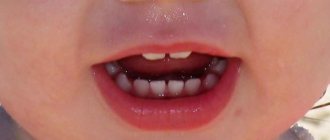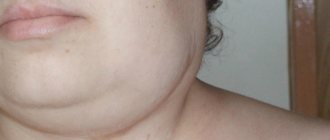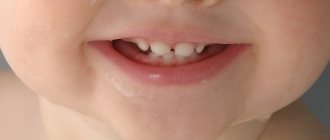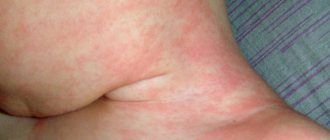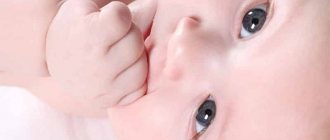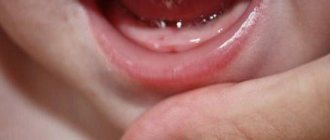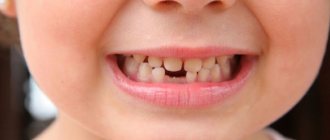About teething, refusal of formula and the competence of the doctor
My name is Svetlana, and my six-month-old baby is Maxim.
At five and a half months, the child's first tooth came out. A few days before, I had slight diarrhea, did not eat well and vomited once. Otherwise the tooth came out painlessly. After this the problems began. Due to my inexperience, I agreed at that moment to vaccinate the child (the first in his life, not counting BCG). The day after the vaccination, the child refused formula milk (previous meals: 9.00 - 270 ml of porridge, 13.00 - 140 g of vegetable puree, fruit puree; 17.00 - Frisov milk formula, 20.00 - Frisov again). The child has been on this mixture since he was 2 months old and has always eaten very well: 250 ml. I took any food restrictions with hostility. At 5 months, Maxim weighed 8.5 kg with a height of 71 cm. And now the child has not eaten formula for the fifth day. The weight is constantly changing: sometimes he gains 60 grams, sometimes he loses 40. He had a temperature (37.5), drank a lot, although until that moment water or drinks with juices could only be poured into him through an enema. Now his diet is absolutely unstable: sometimes he eats porridge, sometimes he only drinks. I would be very grateful for your help: what should I do? After all, at this age it is still too early to give up formula altogether (I tried giving others, I tried everything that is on our shelves)? It doesn’t even matter to me what the reason for such a refusal is, the main thing is what to do next. All the pediatricians I consulted suggest waiting: time heals. I am not satisfied with this state of affairs and therefore my hope is only in you. Thanks in advance for your answer.
I don't think you're describing anything particularly dangerous. In any case, you must decide who commands whom: you are the child or Maxim you. You, an adult woman, think that a child should eat formula, I agree with you. You offer formula, but the child doesn’t want it. You cannot allow the child to remain hungry, so feed him something else. The child develops a reflex - if I scream, I’ll get what I want. If he doesn’t want to, he doesn’t need to. Be patient, but after an hour, give the same thing. If he doesn’t want it, he doesn’t need it, after an hour the mixture comes back, etc. You have no other choice. Or feed him as he wants, but what happens next? All the best.
Komarovsky Evgeniy Olegovich
[Letter] Hello, Evgeny Olegovich.
I received your answer to my question - not competent. In my opinion, you completely misunderstood my question, and perhaps you even inattentively read my letter. You write that “if he screams, he will calm down.” This is if the child has whims! Yes, then I agree with you! But my Maxim is sick—in this case, with his teeth. How can you force a sick child to eat what you and I consider necessary?! I asked you whether it is normal that the child does not eat formula (any), that he only drinks, that he has a temperature (37.5), that he sleeps a lot. I don't think that when you are sick, you will like to eat something that you don't like. This is exactly the case with my child. And I tried to find out from you: IS IT NORMAL THAT HE DOESN’T EAT FORMULATION; THAT HE DRINKS A LOT; WHAT IS TEMPERATURE (37.5).
If it is possible to answer specifically, I would be grateful.
[Doctor's response] Svetlana, hello!
In your previous letter you wrote: “I had a temperature (37.5), I drank a lot...”, in this you write that there was no temperature, but there is. I read the letters carefully and express my opinion. I’m sure that if your, as you write, “pediatrists” do not suit you, and Komarovsky is not competent for you, then maybe it’s better to look for the reason somewhere else, maybe in yourself? When I'm sick, I don't eat, and that's completely normal. For a sick child, the safest, healthiest food is high-quality infant formula. It must be offered. Don't push the child, but offer it. But you can’t follow a child’s lead. The specific answer is that after vaccination, plus teething - thirst, 37.5, and refusal to eat are normal. Last thing. I differ from local pediatricians in that I have the opportunity to choose my patients. You may contact your pediatrician incorrectly, but he has nowhere to hide from you - he is obliged to provide you with help. I don’t owe you anything, neither from the state nor from those who write to me, I don’t have any material benefit. Moreover, I pay for Internet services out of my own pocket. I think that if you are not satisfied with my answers, then the most correct thing is not to insult me with arguments about who is competent and who is not, but simply not to write. All the best to you and your child's health.
Can a baby refuse to eat while teething?
Girls, help, maybe someone has had this happen. We just turned one year old, teething and the child completely refuses to eat! Tomorrow will be a week already. I only manage to stuff in jelly and a little mixture. He flatly refuses regular food to the point of hysteria. I am very worried that the baby has not eaten for so long!! What to do?? The doctor says to give her what she eats, but she eats NOTHING. How can we help? Kalgel has no effect
Try Kamistad, Viburkol suppositories (preferably at night), this is homeopathy. And if it’s really bad, Nurofen or Eferalgan are like pain relievers (Nurofen lasts up to 8 hours, Eferalgan lasts up to four). And with food, unfortunately :(, hang in there. Then you’ll catch up with everything when your teeth come out. Good luck and patience: flower:
Girls, help, maybe someone has had this happen. We just turned one year old, teething and the child completely refuses to eat! Tomorrow will be a week already. I only manage to stuff in jelly and a little mixture. He flatly refuses regular food to the point of hysteria. I am very worried that the baby has not eaten for so long!! What to do?? The doctor says to give her what she eats, but she eats NOTHING. How can we help? Kalgel has no effect
When we have such periods, I put on suppositories (viburcol for more than 4 pieces per day or eferalgan) plus I give what he eats. The mixture, especially before bedtime (daytime, nighttime), so the mixture - at least for days. The period passes (it happened that I ate poorly for about 2 weeks, of course not only the mixture, at least 5 spoons of porridge, vegetables, cottage cheese, etc.) and everything is fine again! Good luck!
Teething. Symptoms.
Parents may not know exactly what to expect when their first child is teething; the appearance of new teeth is often associated with a bad mood or a rise in the child's temperature. But identifying teething symptoms can be difficult for both experienced parents and doctors, as teething symptoms can be very different from another.
Timing of teething in children
Usually, a baby's first tooth appears between the sixth and eighth month, but teething can begin at other times. This may not be earlier than the third month and no later than the child’s first birthday, when he is one year old.
Gums during teething
Check your baby's gums for inflammation or swelling. The outline of the emerging teeth should be visible before the teeth erupt through the gums. Since the first teeth usually appear in the center of the lower jaw, this area of the mouth requires particularly careful examination.
Salivation during teething
Watch for teething symptoms such as increased salivation and rashes on the neck, chin and cheeks. Prolonged drooling is a classic symptom of teething, and wet items can cause irritation and rashes. Salivation can also cause a cough, but if the cough is prolonged and severe, you should consult a pediatrician.
Moodiness during teething
Teething is most likely starting to happen if your baby suddenly becomes fussier and fussier than usual. In general, prolonged crying is not typical for teething, but despite this, it causes discomfort for some babies, leading to whining, sobbing and irritability.
Desire to chew during teething
Watch for your child's increased urge to bite, chew, and chew. Teething babies chew on everything within their reach, and they may bite on the breast while feeding. The counter pressure of biting and chewing brings relief to sore gums, and your little one will appreciate it when you give him something textured and cool to chew on.
Sleep disturbance during teething
Be alert if your baby starts waking up in the middle of the night. Night waking is a common symptom of teething, and your baby may wake up cranky and irritable. This symptom is temporary and should go away after a few days as the teeth break through the gums, after which your baby will sleep peacefully again.
Loss of appetite during teething
Monitor your baby's feeding as teething may cause temporary loss of appetite. In most cases, liquid food is perceived better than solid food, but for some babies, eating food causes discomfort and pain due to inflamed gums. During this period, it is important to ensure that the child receives enough water to avoid dehydration, and there is no need to worry about a decrease in interest in food.
Diarrhea and fever during teething
Call your doctor if teething symptoms last longer than a couple of weeks, or if symptoms are accompanied by a high fever and diarrhea. Contrary to popular belief, these symptoms are not often caused by teething and should be evaluated by your pediatrician to rule out infection or other medical problems.
Ailments during teething
Let's consider what ailments a baby may experience during the dental period. Most often, parents note that their child has poor appetite, upset stool, fever and rhinitis. It is very important to differentiate symptoms that indicate teething from ARVI and other possible diseases.
Refusal to eat
A teething child may refuse to eat. This happens because the baby is bothered by itchy and inflamed gums. Refusal to eat may indicate the occurrence of stomatitis or sore throat. Such phenomena are explained by a decrease in immunity during the period of dentation, and bacteria and fungi that fall on favorable soil begin to multiply rapidly.
You should examine the baby's mouth, gums and throat. If redness is noticeable, use products that will alleviate the symptoms. If you have signs of stomatitis - the presence of white plaque in the mouth, you should consult a pediatrician.
Temperature and snot
Tearfulness, restless sleep, and bad mood can be explained by an elevated temperature. If the thermometer readings are 37.1-37.9°C, it should not be knocked down. It is better to let the baby drink water or put it to the breast once again. It is necessary to monitor the dynamics of temperature changes - if it is observed against the background of redness of the gums, a slight runny nose and does not exceed 37.3, most likely this is a symptom of teething.
Stomach upset
Another common manifestation of a baby’s discomfort during teething is diarrhea. This condition is explained by the fact that the child’s salivation increases significantly, and much more liquid enters the stomach than usual. It is important to control the number of bowel movements per day - if the baby has bowel movements more than 3-4 times a day, this is a reason to consult a pediatrician. The danger is rapid dehydration of the body. During stomach upset, give the child water and light compotes.
Can teething cause stomach pain?
The process of teething occurs individually for each child.
Some parents carefreely rejoice at each new tooth, while others have to deal with a whole bunch of problems, in particular with diarrhea and vomiting in the baby.
Very often these symptoms are combined with elevated body temperature. What is the reason for the body’s response to the natural process of teeth formation, and how can we help the baby cope with this test?
Causes of gastrointestinal disorders
Teething is a very painful process. The changes that occur in the oral cavity affect the functioning of other digestive organs.
The appearance of diarrhea and other intestinal disorders is associated with two main reasons:
- Pain in the mouth leads to increased excitability of nerve endings and excessive irritation. These factors provoke a large number of spasms in the digestive organs and, as a result, diarrhea and other troubles.
- The process of teething is accompanied by increased secretion of saliva, which, when it enters the intestinal tract, causes disturbances in the gastrointestinal tract, which is why digestive problems appear.
Another reason for the occurrence of unpleasant symptoms is that during this period the baby puts everything that is at hand into his mouth. Infections, in turn, entering the digestive tract can cause various disorders in the functioning of the system. That is why parents must be especially careful about hygiene and handle children's toys properly.
When teething, the baby pulls all sorts of objects into its mouth. To avoid infection entering your child’s body, you should carefully monitor the cleanliness of toys, etc.
What digestive disorders may occur?
One of the most common symptoms indicating that a baby is teething is loose stool. It is important not to confuse the body’s natural reaction with an intestinal infection and thereby not provoke the development of complications.
In some cases, the body may experience a reverse reaction to teething - constipation.
Diarrhea, as a sign of teething, has the following character:
- watery consistency;
- natural shade without greenery and impurities in the form of blood;
- an important factor is that stool should be no more than 3 times a day;
- duration - up to 4 days.
Important! If the baby’s bowel movements contain impurities in the form of blood, a green tint, or are too abundant, parents should immediately contact a qualified specialist. You should not treat your child yourself.
In some children, teething is accompanied by a feeling of nausea, frequent regurgitation and vomiting, which appears due to the ingestion of a huge amount of saliva and stops on its own after about 2 days. If your baby's vomiting lasts for more than 3 days, you should contact your pediatrician for help.
Increased intestinal peristalsis during this difficult period can also cause disorders such as increased gas formation, flatulence, bloating and painful colic in the baby.
All this gives the baby a lot of unpleasant sensations, making him even more irritable and capricious.
Such symptoms are mostly due to diarrhea and vomiting and last approximately 4 days.
Associated symptoms
Very often, digestive disorders when teeth appear are accompanied by the following symptoms:
- Increased body temperature. In most cases it ranges from 37.5 to 38°C, but sometimes reaches 39°C. Experts explain this phenomenon by the fact that there is inflammation of the gum tissue at the site where the tooth appears.
If the temperature persists for more than 2 days, a doctor’s consultation is necessary to rule out an infectious disease. If a child develops pale skin and convulsions due to fever, urgent medical attention is needed. Treatment is prescribed only by a qualified specialist.
Painful sensations can cause refusal to eat and loss of appetite
At what age does a child start teething?
Even in the mother's womb, children develop the rudiments of baby teeth, and the timing of their eruption after birth is individual. The time depends on many reasons, in particular:
! There have been cases where a newborn already had two or three teeth, while in some babies the process begins only at one year of age.
The pattern of teething is very arbitrary, since the appearance of teeth in children is a strictly individual process.
On average, children cut their teeth at the following times:
- From 4 to 7 months - the baby's central incisors (lower and upper) appear.
- From 8 to 12 months - first the lower lateral incisors, and then the upper ones.
- At 12–15 months - the first molars (upper and lower).
- At 18–20 months, first the lower and then the upper canines.
- At approximately 20–30 months, growth of the second molars can be observed.
Digestive disorders appear only at the moment a specific tooth appears.
The appearance of teeth in children is a strictly individual process. Parents should not worry about early or late teething. But if the baby does not have a single tooth by 12–14 months, you should consult a doctor.
Help with digestive disorders
In order to help the baby during this difficult period for him, you can take some measures, depending on the symptoms.
To alleviate and eliminate intestinal disorders such as diarrhea, the following recommendations must be followed:
- Put your baby to your breast more often and make sure your baby drinks enough water.
- Eliminate the following foods from your baby’s menu:
- meat;
- fatty foods;
- milk and fermented milk products;
- juices and fresh fruits (bananas are allowed).
- Include in your diet rice and a decoction based on it, mashed potatoes, baked apples, fresh bananas, crackers and dryers, dried pear compote, jelly, strong tea (of course, in small quantities).
- Consult your pediatrician about using Regidron. This product perfectly replenishes fluid levels in the body.
If your baby is vomiting, drinking plenty of fluids is also necessary. Among medications, the pediatrician may recommend taking the already mentioned Regidron and Smecta. An excellent folk remedy is raisin decoction. It is recommended to feed the child well-ground foods (for example, purees), and also to slightly cool both the food itself and the feeding spoon.
To lower body temperature, you should give your baby antipyretics as needed - Nurofen, Children's Paracetamol and others.
Recommendations from experts
Leading experts in the field of pediatrics recommend that parents, during the period of teething, remain calm and monitor the well-being of their child.
Unfortunately, this process is very hectic and causes pain for the child.
All that caring mothers and fathers can do is to show the baby to the local pediatrician and adhere to his recommendations aimed at smoothing out the symptoms.
Doctor Komarovsky about teething in children (video)
The appearance of teeth in children is a difficult period for the whole family. That is why the main task of caring parents and the main recommendation of all leading experts is to be patient and accept the situation as it is. Remember that a child, surrounded by attention and care, endures such a difficult period for him much easier and painlessly.
source
What are the signs of teething in infants?
Teething is a very important event in the life of a baby.
Parents always anxiously await this moment, because the child may begin to act up at this time due to discomfort in the oral cavity.
Indeed, teething in infants is often accompanied by painful symptoms. It can be difficult to determine whether this is actually caused by the appearance of teeth or whether these are signs of some kind of disease.
When do teeth start to erupt?
The age at which teeth begin to erupt largely depends on heredity, the climate of the place of residence, the environmental situation, how the mother ate during pregnancy and many other reasons. However, pediatricians identify the approximate time of teeth appearance, which can be used to assess the child’s development.
By 6-8 months the child should have his first teeth, and by one year there should be eight of them. By the age of two, the baby should have all 20 baby teeth.
Signs of teething in infants
Teething in infants is characterized by the following signs:
- general malaise. During this difficult period, the child’s body experiences enormous stress , so lethargy and fatigue are only the least of the evils. The baby begins to sleep poorly, may even refuse to fall asleep in his crib and only asks to be held. May wake up several times during the night crying loudly. At this time, parents should surround the child with their care and love to the maximum, and not refuse him to fall asleep next to him in the same bed, because he is in severe pain. Mother's care and warmth will allow the child to calm down and relax. Don't get annoyed by his whims;
- Also, the main symptom is excessive salivation. This usually occurs at 5-7 months. At this age, the child does not know how to independently regulate the amount of saliva. This will happen a little later, when he learns to control his reflexes. Excessive salivation occurs due to irritation of the sensitive nerves of the gums, which means that the first tooth will soon appear. There is often so much saliva that the child’s clothes become wet in a matter of minutes;
- pain is also a sign of teething. It is she who pesters the baby and his mother, and all other signs can be tolerated quite easily. When a tooth begins to break through the gum surface, body temperature often rises to 37.5 degrees;
- Symptoms of indigestion often occur. This can include regurgitation, diarrhea and vomiting, all due to the fact that the child drinks a lot of liquid during the day. She begins to loosen the stool. These symptoms should alert you, because it could also be an intestinal infection , which often occurs during this period. The baby begins to put everything in his mouth and these objects are not always clean. Therefore, if you have signs of indigestion, you should consult a doctor;
- A common sign of teething is inflammation of the gums. They swell and become red. These are all the first signs of a tooth appearing , but it can take a long time to erupt. As it grows, the sharp edge of the tooth begins to break through the gums and injure them. They begin to become inflamed and swollen. Sometimes, when fangs begin to erupt, a hematoma may form above the tooth. In this case, surgery is required;
- A slight runny nose with colorless liquid discharge may occur. If in this case there are no other signs of a cold, it means that the formation of a runny nose has provoked increased secretion of mucus in the oral cavity. After a few days everything should go away on its own;
- Sometimes my mouth starts to smell bad. It occurs due to the inflammatory process. Food particles accumulate on swollen gums, which creates favorable conditions for the proliferation of pathogens. This is where the unpleasant smell comes from. In this case, you need to massage the gums with a soft brush and give the child water more often;
- the body may break out in a rash. It mainly occurs on the chin, where it is constantly damp due to excessive salivation;
- Sometimes a sign of teething occurs such as stomatitis. An infection brought into the mouth contributes to its occurrence. The gums itch and itch, and the baby, in order to relieve these unpleasant symptoms, begins to put everything in his mouth, thanks to which infection easily enters the body. The oral cavity becomes covered with painful ulcers. The child does not allow himself to look into his mouth, begins to refuse to eat , and his body temperature rises;
- By the way, refusal to eat is one of the main signs of teething. Because of this, weight gain stops and immunity begins to weaken. A child can easily catch any disease.
Source: https://sfmggu.ru/mozhet-li-pri-prorezyvanii-zubov-bol-v-zhivote/
How to feed a child during this period?
Despite general malaise and refusal to eat, the child should not be allowed to go without eating for a long time. Pediatricians recommend adhering to the following rules:
- Maintain drinking regime. During the dental period, the baby should receive a sufficient amount of fluid. This can avoid dehydration, reduce the temperature, and also improve the general condition of the child.
- If the baby is breastfed, give him breastfeeding on demand. Refusal to breastfeed is a reason to feed him with a spoon or glass. At this time, you should not introduce new products, give only those to which the child is already accustomed.
- If your baby is prone to diarrhea, you can reduce the amount of vegetables and fruits in his diet. Let him eat porridge, crackers, and children's cookies instead. If your baby has already tried compote, you can offer him jelly, which will help improve the functioning of his stomach.
Pain relief at home
At home, you can alleviate the child’s condition. The problem should be approached comprehensively. In addition to changing your diet, you should also think about medications. It is with the help of medications that you can help your baby cope with discomfort and pain. Let's consider what remedies can be taken internally, externally and how to act using traditional methods.
Medicines for oral administration
First, let's figure out what medications can alleviate the child's general condition. It is impossible to speed up or change the process of teething, but parents are quite capable of stopping the symptoms. If the baby feels pain, cries, chews his fists and sleeps poorly, you can give him paracetamol-based drugs. The medicine will relieve pain and slightly reduce the temperature. Ibuprofen products act similarly, but their effect is stronger.
It is acceptable to use homeopathic medicines. Today, Dentokind tablets are quite popular and can be given to infants. According to the manufacturer, the product removes the symptoms inherent in teething - fever, pain, itching. The tablet dissolves easily in a teaspoon of boiled water.
Use of gels and ointments
If the baby is very restless, topical medications can be used. The pharmacy sells gels and ointments that need to be applied directly to the gums. Swollen areas should be smeared after meals and can be done several times a day. The gels contain painkillers and anti-inflammatory components. Some of them are cooling. The most relevant products for infants:
- Dentinox gel (includes fructose, allergies are possible);
- Dentol-baby product;
- Cholisal gel;
- Kalgel drug (from 5 months).
At the pharmacy, the pharmacist may recommend purchasing another product that is available. It is important that the drug is suitable for the child’s age and does not cause allergies.
Homeopathy also offers its own remedies for topical use. Oh and Baby Doctor.
Folk remedies
The most popular recipes that are suitable for use in infants:
- Herbal teas help soothe pain and relieve itching in the gums when teeth come in (we recommend reading: in what order teeth come in: order and photo). The following compositions are used: lemon balm, catnip, chamomile, primrose, lavender. A tablespoon of raw material is poured into a glass of boiling water and left in a water bath for about 40 minutes. Give your baby a weak concentration of this tea - dilute the strained solution with boiled water in a 1:1 ratio.
- Valerian infusion. Give your child 2 drops of tincture diluted with water at night. It can also be applied to the gums.
- Honey and propolis are used to lubricate the gums. These products are strong allergens, so first use a small dose, only then lubricate the gums generously.
Teething syndrome
Many mothers tend to attribute any ailment of the baby to the growth of teeth. However, it is necessary to distinguish when the symptoms really indicate teething syndrome and when they indicate some kind of disease. Our consultant is pediatrician, neonatologist at the Pediatr clinic, Mikhail Sokolovsky.
Teething syndrome is characterized by nonspecific symptoms that can indicate either tooth growth or some disease:
lethargy, moodiness, refusal to eat;
low temperature (up to 38 degrees), and it drops easily if you give the child an antipyretic, but more often it decreases on its own, without any intervention;
Timing of teething in children
The process of dentition (teething) occurs individually for each baby. However, there are deadlines within which each new tooth must appear. We have compiled information about the timing of teething into a table.
| Age, months/years | Lower jaw | Age, months/years | Upper jaw |
| Six months – 10 months. | Central incisors | 8 months - 1 year | Central incisors |
| 10 months – 1 year 4 months. | Lateral incisors | 9 months – 1 year 1 month. | Lateral incisors |
| 1 year 2 months – 1.5 years | Mandibular first molars | 1 year 1 month – 2 years 7 months. | First molars |
| 1 year 5 months – 1 year 11 months. | Fangs | 1 year 4 months – 2 years 10 months. | Fangs |
| 1 year 11 months – 2 years 7 months. | Second molars | 2 years 1 month – 2 years 9 months. | Second molars |
It is worth noting that deviation from the norm is allowed in the region of 2-3 months in one direction or another. If your child is one year old and his teeth have not yet erupted, it is worth taking him to the pediatrician.
READ ALSO: Teeth cutting at 2 months - is that good or bad?


